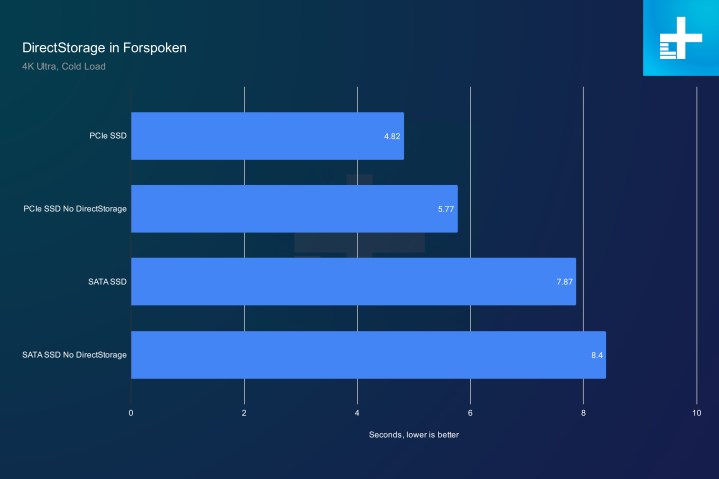Yesterday, we published that DirectStorage might be killing your frame rate in Forspoken. This claim was based on some early testing from the PC Games Hardware YouTube channel, which claimed upwards of a 10% drop in frame rate when using DirectStorage. As some new testing has proven, that’s has turned out to not be true.
It’s a classic case of assuming on my part, and you know what they say about that. Although generally a reliable German source for PC hardware coverage, the YouTube channel didn’t take into account loading screens when running its benchmarks. Naturally, a SATA SSD took longer to load than a PCIe SSD, boosting the average frame rate for the slower drive.

A thanks goes out to ComputerBase and Tom Warren at The Verge for highlighting this mistake. But lest I fall into the trap of assuming third-party data is accurate again, I booted up Forspoken and decided to test a PCIe 3.0 SSD and SATA SSD for myself.
DirectStorage shines best on PCIe 4.0 SSDs, but the original claim from PC Games Hardware showed a difference between SATA and PCIe — there wasn’t a difference between Gen 3 and Gen 4 drives in performance. Instead of relying on the in-game benchmark, I went out into the open world for some testing instead.
And there is a minor difference in performance. At 4K with the AMD RX 7900 XTX, I measured 52.4 frames per second (fps) with the PCIe SSD and 53.9 fps with the SATA SSD. Given the rather poor optimization of Forspoken on PC, it’s safe to chalk up this difference to variance in the game, not DirectStorage.
Much more interesting were the loading times. Again, I tried to boot from a cold save rather than using the in-game benchmark. This meant completely closing the game and trying to load a save, as resuming a save after already playing the game can lead to slightly faster loading times.

Although it’s not the fraction of a second that you see in the benchmark, Forspoken loads significantly faster with a PCIe SSD. That’s no shock, but DirectStorage itself also shaves off nearly a full second. Thankfully, that benefit applies to the SATA SSD, as well, though to a lesser degree.
It’s early days for Microsoft’s DirectStorage tech, with Forspoken being the only showcase on PC of it. It’s a problematic PC release for a number of reasons — visual bugs and constant hitching chief among them — but one thing is certain: DirectStorage isn’t causing problems in the game.
Still, it’s important to keep an eye on DirectStorage in future releases. GPU decompression in Microsoft’s tech promises to reduce CPU usage in games by offloading some work onto the graphics card. This shouldn’t impact your frame rate, as the CPU is a critical bottleneck for I/O operations like streaming in-game assets. However, it’s possible DirectStorage could represent a minor performance difference in the future, especially on less powerful graphics cards.
It’s far too early to make assumptions about what DirectStorage could do in the future. With the first look at Forspoken, it vastly improves loading times as Microsoft promises. And once those games arrive, I promise to do first-hand testing rather than relying on potentially inaccurate data from third-party sources.
Editors’ Recommendations
Services Marketplace – Listings, Bookings & Reviews
